Archive
Earthgauge News – Oct. 23, 2017
Edition #3 of the new Earthgauge News podcast for the week of Oct. 23, 2017.
A weekly Canadian environmental news podcast featuring the top stories from across Canada and around the world.
Join me here every Monday or subscribe in iTunes or your favourite podcast catcher.
EG Radio May 9: the Kalamazoo River oil spill 3 years later

Photograph: State of Michigan
This week on Earthgauge, we take a look back at what happened in Michigan in 2010 when an Enbridge pipeline ruptured spilling roughly 1 million gallons of oil into the Kalamazoo River. What is the legacy of the spill and is there anything for the rest of us to learn as we debate the construction of more pipelines from the tar sands of Alberta to B.C. and the Gulf of Mexico?
I have 3 interviews on the program today:
- Susan Connelly, a local resident of Marshall, MI where the spill occurred
- Jeff Insko, founder of the Line 6B citizen’s blog, a web site for residents who have pipelines running directly beneath their property
- Josh Mogerman, spokesperson for the Natural Resources Defence Council
We’ll also have our usual update from Kathy of Ecology Ottawa on local environmental events and campaigns.
Click the audio player above to stream the show or right click here to download.
Thanks to a fellowship from the Institute for Journalism and Natural Resources, I had the opportunity to travel to Kalamazoo and the surrounding area last week to learn about the Kalamazoo River and, in particular, the Enbridge oil spill of 2010.
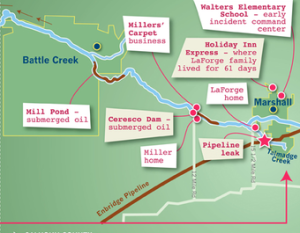
On Sunday, July 25, 2010, Enbridge Line 6B ruptured near Marshall, Mich. and released more than one million gallons of tar sands diluted bitumen into Talmadge Creek and the Kalamazoo River. Illustration by Catherine Mann for InsideClimate News.
Remember that one? It happened on July 25 just a couple weeks after BP finally sealed their leak in the Gulf of Mexico following the explosion of the Deep Water horizon oil rig that killed 11 workers.
Six inches of rain fell in the days after the Enbridge pipeline spill, raising Talmadge Creek and the Kalamazoo River into “a roiling brown torrent that overflowed its banks by several feet,” according to the seven-month, Pulitzer prize-winning investigation conducted by InsideClimate News. Talmadge Creek, which is usually five to six feet wide and a foot deep, stretched 100-feet wide after the downpour.
The spill occurred in Marshall, a community of 7,400 in southwestern Michigan. It drove 150 families permanently from their homes, yet the media spotlight never settled on their story — perhaps in part because this spill occurred 10 days after BP Plc’s Macondo well was finally capped after three months of spewing oil into the Gulf of Mexico.
Enbridge Energy Partners, a U.S. affiliate of Enbridge Inc., operated the pipeline. The company has spent more than $765 million cleaning up the spill.
Oiled sections of the Kalamazoo River reopened to the public in June 2012 — 23 months after the spill.

Photograph: State of Michigan
On today’s special show, we hear a couple different perspectives from residents who have been affected by the spill and its aftermath. First up is Susan Connelly, a local resident who was living near the oil spill when it occurred. Her kids daycare was just a half mile away so she tells us about some of the health effects her family and her community suffered immediately following the spill and in the intervening 3 years.
Susan Connelly (right click here to download):
Next we hear from another local resident Jeff Insko who started the Line 6B citizen’s blog. After the rupture of the pipeline known as line 6B, Enbridge decided to replace a huge section of pipe through Michigan, some of which runs through the property of local residents. Jeff will tell us why he has been less than satisfied in his dealings with Enbridge as they exercised their legal authority to do dig up his property and cut down all his trees in order to install new pipe. Will his experience be echoed by many other property owners as new pipelines are constructed in the coming years across North America?
Jeff Insko (right click here to download):
Finally, we hear from Josh Mogerman of the Natural Resources Defense Council on why he feels tar sands oil is much more difficult and problematic to transport through pipelines than conventional crude and how this may have played a role in the Kalamazoo spill.
Josh Mogerman (right click here to download):
First though, to get some context on what actually happened in the summer of 2010, we hear a piece from The Rachel Maddow Show on MSNBC, which was broadcast in July 2012 following the release of the US National Transportation Safety Board’s scathing report about Enbridge’s handling of the spill and their mistakes leading up to it.
Why does a pipeline rupture in Michigan matter? Well, because many plans are afoot for new pipelines from the tar sands of Alberta, including proposals through the US in the form of the Keystone XL pipeline and to the west coast of B.C. with the Northern Gateway pipeline. So today we’re going to find out about the experiences of local residents looking back 3 years later at the Kalamazoo River spill in 2010. Let’s hope we’ve learned our lessons and don’t repeat the mistakes of Kalamazoo as we debate the merits of constructing new pipelines across North America to extract even more tar sands oil at ever increasing rates.
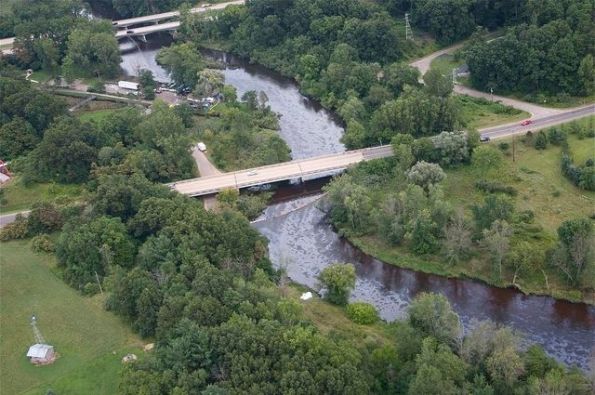
Photograph: State of Michigan
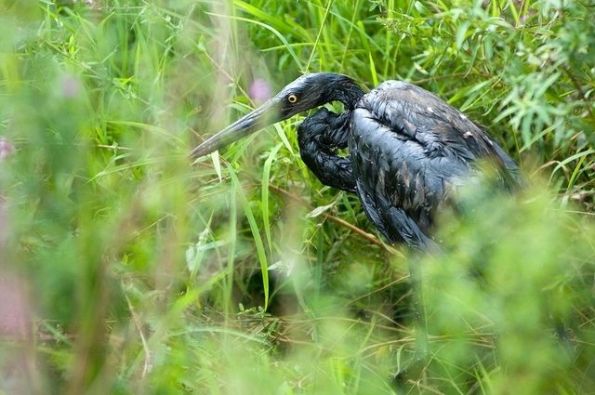
Photograph: State of Michigan
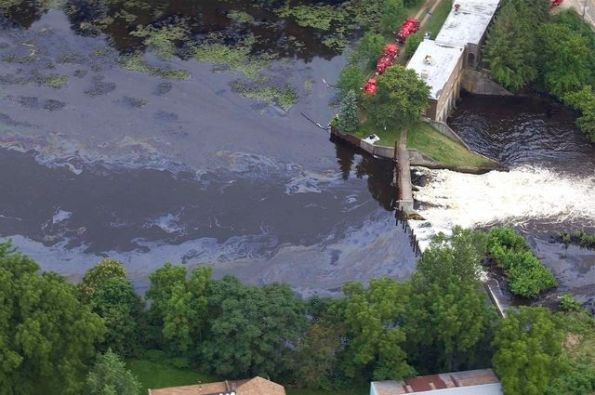
Photograph: State of Michigan
Tomorrow on EG Radio: the Kalamazoo River oil spill

This week on Earthgauge, we’ll take a look back at what happened in Michigan in 2010 when an Enbridge pipeline ruptured spilling roughly 1 million gallons of oil into the Kalamazoo River. What is the legacy of the spill and is there anything for the rest of us to learn as we contemplate the construction of more pipelines from the tar sands of Alberta to B.C. and the Gulf of Mexico?
I was in Kalamazoo and the surrounding area last week and I had the opportunity to speak with residents who have been affected by the spill and its aftermath. First we hear from Susan Connelly, a local resident who was living near the site of the spill when it occurred. Her kids’ daycare was just a half mile away so she’ll tell us about some of the health effects her family and her community suffered following the spill and in the intervening 3 years.
Next we’ll hear from another local resident, Jeff Insko, who started the Line 6B citizen’s blog. After the rupture of the pipeline known as line 6B, Enbridge decided to replace a huge section of pipe through Michigan, some of which runs beneath the property of local residents. Jeff will tell us why he has been less than satisfied in his dealings with Enbridge as they exercised their legal authority to dig up his land and cut down his trees in order to install their new pipe.
We’re also going to get an overview of the incident from Rachel Maddow of MSNBC who did a feature last summer when the US National Transportation Safety Board issued a scathing report about Enbridge’s handling of the spill and their mistakes leading up to it.
Of course we’ll also have our usual update from Kathy of Ecology Ottawa on local environmental events and campaigns. That’s at around 7:50.
Tune in tomorrow!
EG Radio March 28: Federal Budget 2013, urbanization in Kenya and the tar sands “staples” trap
We love covering local stories on Earthgauge and this week, we get just about as local as we can, focusing on some compelling environmental research taking place at Carleton University in Ottawa. We also take a look at the environmental provisions of last week’s federal Budget 2013. We have 3 interviews on today’s show:
- Glennys Egan on the environmental and human impacts of urbanization in Kenya
- Brendan Haley on the tar sands “staples trap”
- Andrew Van Iterson on the environmental measures in Budget 2013
We also have our usual update from Kathy of Ecology Ottawa on local environmental events and campaigns.
Click the audio player above to stream the show or right click here to download.
Part 1 – Budget 2013
Right click here to download.
To kick off the program this week, I speak with Andrew Van Iterson who is the manager of the Green Budget Coalition. Environmental funding in last week’s 2013 federal budget had very little in the way of environmental provisions. Sustainable Development Technology Canada, a government-funded venture capital firm that invests in environmental technology firms, will get $325 million over eight years and there is some funding for municipal projects, notably the City of Ottawa’s new wastewater holding tanks. But the green measures are pretty slim beyond that. The Green Budget Coalition, founded in 1999, brings together sixteen leading Canadian environmental and conservation organizations, which collectively represent over 600,000 Canadians, through our volunteers, members and supporters. They make an annual set of recommendations to the federal government regarding strategic fiscal and budgetary opportunities.
Part 2 – Glennys Egan
Right click here to download.
Next up Earthgauge contributor Juanita Bawagan speaks with Glennys Egan who is a Masters student in the African Studies program at Carleton whose research is based on issues of urbanization in Kenya. She has recently been in Kenya working with a community organization through Street Kids International based in a Nairobi slum and she tells Juanita about her research and experiences there, and the environmental and human impacts of urbanization in Kenya.
Part 3 – Brendan Haley
Right click here to download.
In the second half hour, I speak with Brendan Haley who is a PhD student at Carleton’s School of Public Policy and Administration and a fellow of the Broadbent Institute. He co-authored a recent study called ‘The Bitumen Cliff’ warning that the poorly regulated bitumen industry is creating a double threat to Canada: a so-called “staples trap,” with an economy over-reliant on bitumen exports, and a “carbon trap,” locking Canada into fossil fuels instead of adapting to climate change. The report was co-authored by the Canadian Centre for Policy Alternatives and the Polaris Institute.
Earthgauge Radio airs every Thursday morning at 7:00 AM on CKCU 93.1 FM in Ottawa and online around the world at www.ckcufm.com. Ottawa’s only radio program dedicated exclusively to environmental news and commentary from Ottawa, across the country and around the world. Podcasts on iTunes and right here on earthgauge.ca.
Earthgauge Radio February 14 2013: Ottawa Riverkeeper Meredith Brown and Climate Science 101
This week on Earthgauge, I present a feature interview with the Ottawa Riverkeeper, Meredith Brown and we talk climate science with Eric Galbraith of McGill University. Click the audio player above or right click here to download the show.
Brown and we talk climate science with Eric Galbraith of McGill University. Click the audio player above or right click here to download the show.
First up….it’s Climate Change 101! Ever want to know about some of the fundamentals of climate science so you can easily refute that climate change denying buddy of yours? Well, we have a Climate Change 101 session with Eric Galbraith of McGill University. He is a Professor of Earth and Planetary Science and he’ll explain just why it is there is virtually no disagreement among climate scientists that the planet is warming and humans are to blame. Additional resources that provide excellent information on the fundamentals of climate science include www.skepticalscience.com, www.livescience.com, and www.thinkprogress.org.
Later on the show, I speak with the Ottawa Riverkeeper Meredith Brown. Founded in 2001, Ottawa Riverkeeper is an independent voice for the Ottawa River, providing leadership and inspiration to protect, promote and improve its ecological health and future. The organization works collaboratively to inspire others to take action, to encourage responsible decision making, to hold polluters accountable and to recommend alternative practices and policies to safeguard our local waterways. Ottawa Riverkeeper is a member of Waterkeeper Alliance, an international grassroots organization founded by Robert F. Kennedy Jr.
Meredith Brown is a strong science-based voice for the Ottawa River, acting as its full-time “watchdog”. Since 2004, Meredith has significantly raised the profile of the Ottawa River and brought important issues such as sewage dumping and radioactive waste to the attention of the public and decision-makers.
In our interview, we discuss the health of the Ottawa River, changes to federal environmental regulations, the Wild and Scenic Film Festival and the Ottawa River Action Plan.
Of course we also have our usual update from Kathy of Ecology Ottawa on local environmental events and campaigns.
Earthgauge Radio airs Thursday mornings from 7-8 AM on CKCU 93.1 in Ottawa. Podcasts on iTunes and earthgauge.ca. Stream live on www.ckcufm.com. Check out our Facebook page at www.facebook.com/EarthgaugeRadio where we post environmental news stories from around the world.
EG Radio February 7 2012: Liveable Ottawa | Shell oil rig Alaskan disaster
This week on Earthgauge Radio, we’re talking about the Shell drilling rig that ran aground near Alaska’s Kodiak Island at the end of December and we discuss the City of Ottawa’s “Liveable Ottawa” plan. We also have a special guest editorial from Grist.org columnist David Roberts who will explain why climate science is Nate Silver and U.S. politics is Karl Rove.
It was bad enough that Shell demonstrated total ineptitude when their Kullik oil rig started leaking crude oil into the Alaskan wilderness but as Rachel Maddow of MSNBC tells us, this story just keeps getting weirder and weirder. Now it appears the accident may have been a result of Shell trying to pull a fast one on the state government to avoid paying taxes. The damaged Kulluk drillship is a key part of Royal Dutch Shell’s ambitious plan to drill for oil in two parts of the Arctic Ocean.
Later in the show we talk to Trevor Haché of Ecology Ottawa about the Liveable Ottawa initiative that this city has launched recently. Starting in 2013, the City of Ottawa will begin its review of the strategic documents that guide the development of our city. They include the Official Plan, Transportation Master Plan, Infrastructure Master Plan, Cycling Plan and Pedestrian Plan. When completed, the Building a Liveable Ottawa 2031 project will set the directions, policies and affordability priorities that will influence the future of the city for years to come. To help with this process, the City is looking for input from citizens like you and me. So if you care about pedestrian infrastructure, cycling and public transportation now is the time to pay attention to what is happening at Ottawa City Hall. Email if you want to get involved or contribute your input to the Liveable Ottawa Master Plan.
Trevor Haché interview (right click here to download):
We also have a special guest editorial from the excellent climate, energy and political columnist David Roberts of Grist.org. Remember Nate Silver? The guy who perfectly predicted the outcome of the recent U.S. election state by state? Republicans dismissed the science of his projections and yet he was exactly right. Well, David Roberts sees a parallel with climate science and those who refuse to believe it.
Of course we also have our usual update from Kathy of Ecology Ottawa on local environmental events and campaigns.
Earthgauge Radio airs Thursday mornings from 7-8 AM on CKCU 93.1 in Ottawa. Podcasts on iTunes and earthgauge.ca. Stream live on www.ckcufm.com. Check out our Facebook page at www.facebook.com/EarthgaugeRadio where we post environmental news stories from around the world.
Right click here to download today’s show.
China is burning almost as much coal as the rest of the world combined
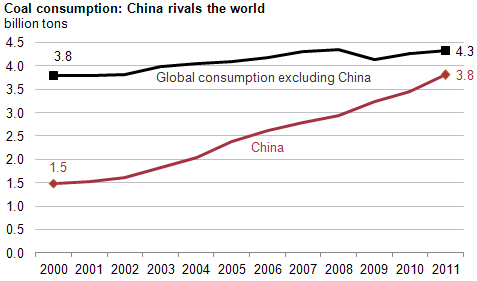
Time Magazine published a sobering article recently that provides some idea of the daunting challenge facing activists around the world who are trying to build a movement to confront the worsening problem of climate change. As the chart from the U.S. Energy Information Administration (above) indicates, coal consumption in China is now almost equivalent to the amount of coal in the rest of the world. Why? Because coal in China is so darn cheap and there is just so much of it. Remember that coal is a much dirtier form of energy and emits more heat trapping carbon dioxide when burned than does oil. Add to this the fact that in the coming years, India is poised to match China’s coal consumption and we’ve got ourselves a big problem, despite President Obama’s recent remarks about the urgency of addressing the climate crisis. What can he really do in the face of this cold, hard reality?
Here’s an excerpt:
“Coal already accounts for 20% of global greenhouse-gas emissions, making it one of the biggest causes of man-made climate change. Combine that with the direct damage that air pollution from coal combustion does to human health, and there’s a reason why some have called coal the enemy of the human race.
“The EIA’s chart also shows how limited President Obama’s ability to deal with climate change really is. The reality is that the vast majority of the carbon emissions to come will be emitted by developing nations like China — and much of that will be due to coal. As we’ve reported, the U.S. has reduced coal use and cut carbon emissions in recent years, even in the absence of comprehensive climate legislation, thanks to tougher air-pollution regulations and cheap natural gas from fracking. Yet even as coal has waned in the U.S., it’s still being burned by the gigaton in other countries. We won’t beat climate change until we’ve beaten coal, but I’m not sure there’s much the U.S. can do to persuade China or India to quit cheap energy — no matter the cost.”
Read more: http://science.time.com/2013/01/29/the-scariest-environmental-fact-in-the-world/#ixzz2JUZ5n4tv
Interview with Dr. James Brophy about a groundbreaking study on the links between workplace pollutants and breast cancer
On Earthgauge Radio this week, I featured an interview with Dr. James Brophy who is an adjunct professor at the University of Windsor and the co-author of a groundbreaking new study demonstrating that women working in particular occupations have an increased risk of developing breast cancer, likely due to exposure to toxic chemicals and environmental pollutants. Click the audio player to stream the interview or right click here to download.
This research, which was published in the prestigious online journal Environmental Health, seems to support growing evidence of the links between pollutants in our environment and the risks of developing serious diseases such as cancer. Dr. Brophy and Dr. Margaret Keith found that women working in particular occupations, such as manufacturing and farming, have an increased risk of developing breast cancer. Women employed in the automotive plastics industry, for instance, were almost five times as likely to develop breast cancer, prior to menopause, as women in the control group.
Needless to say, this research has been causing quite a stir and has been reported around the world as a groundbreaking contribution to women’s health. Jeanne Rizzo, president of the Breast Cancer Fund, a San Francisco-based group that has pressed for more research into environmental causes of breast cancer called the study “a very powerful piece of work. The piece that’s really been missing for female breast cancer is occupation.” The study clearly demonstrates the value of including detailed work histories in the environmental and occupational epidemiology of breast cancer. In our interview, James Brophy discusses how and why the study was conducted, the implications of this research and why the cancer research community has been so slow to recognize the occupational and environmental risks associated with breast and other forms of cancer.
Earthgauge Radio December 13 2012: Cancer in the workplace and the crisis of ocean acidification
This week on Earthgauge Radio, we’re talking about environmental health and ocean acidification. I have two interviews on the program today:
- Dr. James Brophy, co-author of a groundbreaking new study demonstrating that women working in particular occupations have an increased risk of developing breast cancer, likely due to exposure to toxic chemicals and environmental pollutants
- Dr. Robert Rangeley of the World Wildlife Fund of Canada who will explain why the rapid acidification of the word’s oceans threatens many forms of marine life and may even endanger the oceanic food chain
Click the audio player above to stream the show or right click here to download. Individual interviews with James Brophy and Robert Rangeley will be posted shortly.
Part 1 – Ocean acidification
The United Nations International Climate Change Conference in Doha, Qatar wrapped up last week. Although virtually ignored in the Canadian mainstream media, we covered it here on Earthgauge quite extensively but in the end, little was accomplished with no new commitments to cut CO2 emissions and no new funding being committed. Only 37 of the 195 participating nations agreed to extend the ineffectual Kyoto Protocol to curb greenhouse gas emissions and as Reuters news agency reported, “many of those most concerned about climate change are close to despair.”
Meanwhile, global emissions in 2012 are expected to rise by 2.6 percent over 2011 levels. This represents an astonishing 58 percent increase in emissions since 1990. Now we’ve talked a lot on this show about what all this excess CO2 means for our changing climate but what are the implications for the global oceans? After all, about a quarter of all carbon dioxide emissions are absorbed by the earth’s oceans, where they’re having an impact that’s just starting to be understood.
It turns out excess CO2 due to burning fossil fuels is actually changing the chemistry of the seas and proving harmful for many forms of marine life. A more acidic ocean could wipe out species, disrupt the food web and impact fishing, tourism and other human activities on the oceans. Over the last 250 years, oceans have absorbed 530 billion tons of CO2, triggering a 30 percent increase in ocean acidity.
So to kick off the program today we welcome our newest Earthgauge contributor, Xerez Bridglall, who will bring us an interview she did with Dr. Robert Rangeley, the VP of Conservation, Atlantic Region, for the World Wildlife Fund Canada. Sometimes described as “the other CO2 problem”, the rapid acidification of the word’s oceans represents an extremely grave threat not only to marine life but of course to the vast majority of humanity who depend on the bounty of the oceans for our food, well being or our livelihoods. Dr. Rangeley will explain what is happening and why it is so important.
Robert Rangeley:
Right click here to download this interview.
Part 2 – Toxic chemicals and cancer
Sticking with the petrochemical theme, on the program today we’re also talking about environmental health and the growing evidence of links between pollutants in our environment and serious diseases such as cancer. I am thrilled to present a feature interview today with Dr. James Brophy, who is the co-author of a remarkable new study published in the prestigious online journal Environmental Health demonstrating that women working in particular occupations have an increased risk of developing breast cancer. Their research found that women employed in the automotive plastics industry, for instance, were almost five times as likely to develop breast cancer, prior to menopause, as women in the control group. This study clearly demonstrates the value of including detailed work histories in the environmental and occupational epidemiology of breast cancer.
Needless to say, this research has been causing quite a stir and has been reported around the world as a groundbreaking contribution to women’s health. Jeanne Rizzo, president of the Breast Cancer Fund, a San Francisco-based group that has pressed for more research into environmental causes of breast cancer called the study “a very powerful piece of work. The piece that’s really been missing for female breast cancer is occupation.”
So recently I caught up with Dr. James Brophy who is an adjunct professor at the University of Windsor to talk to him about how and why the study was conducted, the implications of this research and why the cancer research community has been so slow to recognize the occupational and environmental risks associated with breast and other forms of cancer.
Earthgauge Radio airs Thursday mornings from 7-8 AM on CKCU 93.1 in Ottawa. Podcasts on iTunes and earthgauge.ca. Stream live on www.ckcufm.com. Check us out on Facebook at www.facebook.com/EarthgaugeRadio.
On Earthgauge Radio tomorrow: Getting cancer at work and the ticking timebomb of ocean acidification
Tomorrow on Earthgauge Radio, I am pleased to present a feature interview with Dr. James Brophy, who is the co-author of a groundbreaking new study demonstrating that women working in particular occupations have an increased risk of developing breast cancer. Their research found that women employed in the automotive plastics industry, for instance, were almost five times as likely to develop breast cancer, prior to menopause, as women in the control group. The research results have created quite a stir in the cancer research community and our discussion tomorrow is not to be missed!
We’ll also have an interview from our new Earthgauge contributor, Xerez, on a very serious problem related to the burning of fossil fuels that does not receive as much attention as melting Arctic sea ice and glaciers, super storms, rising sea levels, floods and droughts. Sometimes described as “the other CO2 problem”, the rapid acidification of the word’s oceans represents an extremely serious threat that has many scientists concerned. Excess CO2 due to burning fossil fuels is actually changing the chemistry of the sea and proving harmful for many forms of marine life. A more acidic ocean could wipe out species, disrupt the food web and impact fishing, tourism and other human endeavours on the sea. Over the last 250 years, oceans have absorbed 530 billion tons of CO2, triggering a 30 percent increase in ocean acidity.
On tomorrow’s show, Xerez will speak with Dr. Robert Rangeley, the VP of Conservation, Atlantic Region, for the World Wildlife Fund Canada about this important issue.
Tune in every Thursday morning at 7:00 AM to Ottawa’s only radio program dedicated exclusively to environmental news and commentary from here in Ottawa and around the world. Earthgauge Radio on CKCU 93.1 in Ottawa and online at www.ckcufm.com. Podcasts on iTunes and http://earthgauge.ca.